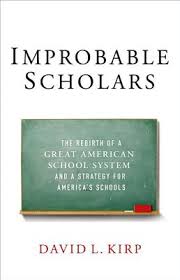The second group of reformers argues that the system of education institutions is mostly fine, and that factors external to the system are responsible for our woes (which are, in any case, exaggerated). Some point to social and economic factors, others to the incoherence in curriculum (cf the Common Core), and others to the very reform measures (especially standardized tests used to evaluate schools and teachers) instituted by the other group of reformers.

Improbable Scholars follows in the tradition of numerous education books by recounting time that the author spent in a school or district. Kirp tells the story of Union City, NJ, a city like so many others in the US: it has a great manufacturing past (“Embroidery Capital of the United States”) but was unable to find a new economic identity when cheap imports undermined its industries. Now most of its residents live in poverty, and a large percentage are recent immigrants who speak little English.
But Union City schools are unlike most districts with this profile. Despite the demographics, Union City students score about average on state tests. Ninety percent graduate high school, and sixty percent go on to college.
How they do it is Kirp’s subject, and in one sense this book has the feel of many others. The account is told through stories. We meet Alina Bossbaly, a local legend of a third-grade teacher who is able to connect even with the most difficult children, and to make them feel a part of the classroom community, a process that has come to be known as “Bossbaly-izing” children.
We meet long-time Union City Mayor Brian Stack, strong supporter of education, savvy politico in a tough political town, and point man in the procurement of funding for the new 180 million dollar high school.
Kirp is an academic, not a journalist, so although he’s an able writer, you’re not in the hands of a professional storyteller or fact-finder. But what you get from Kirp is a deeper analysis, a better-than-even tradeoff in this case.
So what is Kirp’s conclusion? He offers a list of key factors that he says must be in place for a district to thrive:
- District leaders put the needs of students ahead of those of staff
- They invest in quality preschool
- They insist that a rigorous curriculum is consistently implemented
- They make extensive use of data to diagnose problems
- The engender a culture of respect among the staff
- They value stability and avoid drama—they make a plan and stick with it for the long haul
- They never stop planning and reviewing the results of their plans.
When a district posts a remarkable record, it’s natural to ask “how did they do it?” The obvious problem is you’re looking at a single district. Maybe the real key to Union City is the Mayor. Maybe it’s the fact that many of the students come from countries with a tradition of respect for authority.
Kirp makes a case that other unusually successful districts have the same set of factors in common. It’s no substitute for a quantitative analysis, but KIrp at least shows that he’s aware of the problem.
And to be clear, I read the book in this wise, as something like an ethnographic study. Books like this offer detail and texture that larger scale, more rigorous analyses lack. In so doing, they ought to be inspiration to more quantitatively oriented researchers for what they are missing and where to turn their sights next.
When it comes to criticizing methods he thinks are ineffective, Kirp is less sure-footed. He dismisses the notion that the relationship between school funding and student achievement is uncertain by noting that such suggestions leave administrators “shaking their heads.” There is an extensive and complex literature on the impact of funding, and the proper conclusion is by no means as simple Kirp would like us to believe.
Likewise, I’m rankled by Kirp’s assertion that “If you’re a teacher or principal whose job is on the line and your ordered to accomplish what seems unattainable, cheating is a predictable response.” This sounds an awful lot like a tacit pass to cheating educators.
The section of Improbable Scholars devoted to “what doesn’t work” left a bad taste in my mouth because it comes at he end of the book, but it is a mere five pages long.
If you’re curious about one vision of successful education that more or less maintains the status quo and actually gets into some detail, Improbable Scholars is a good choice.
 RSS Feed
RSS Feed